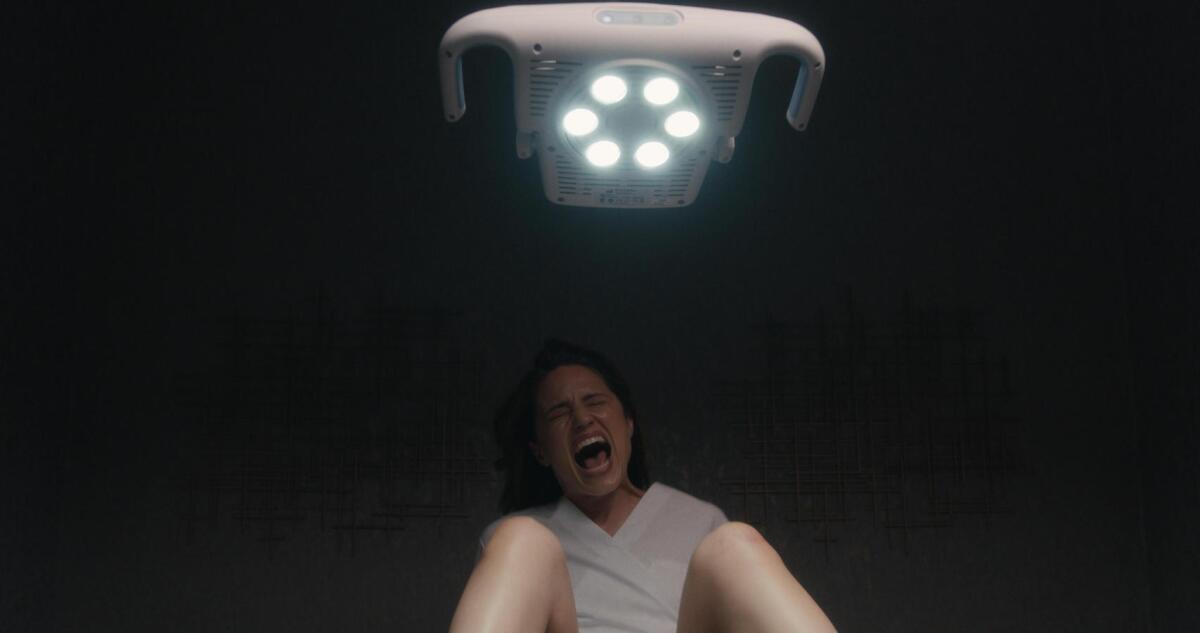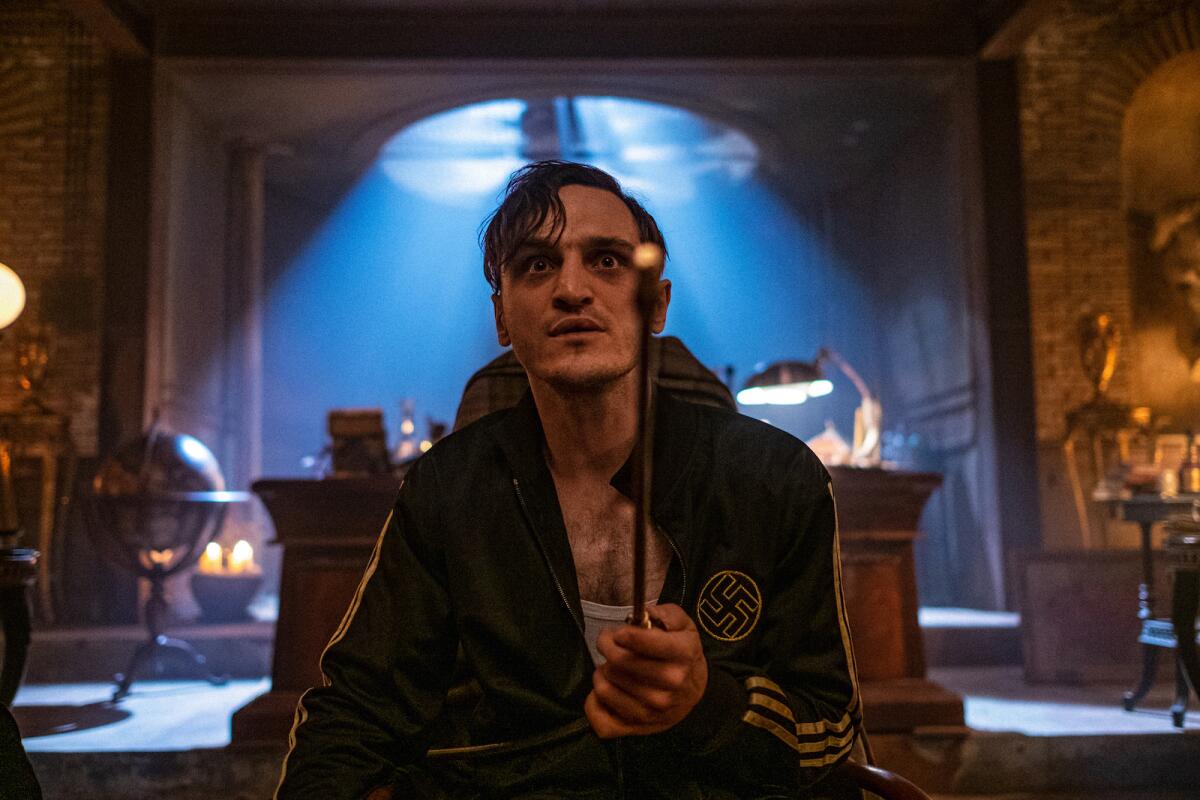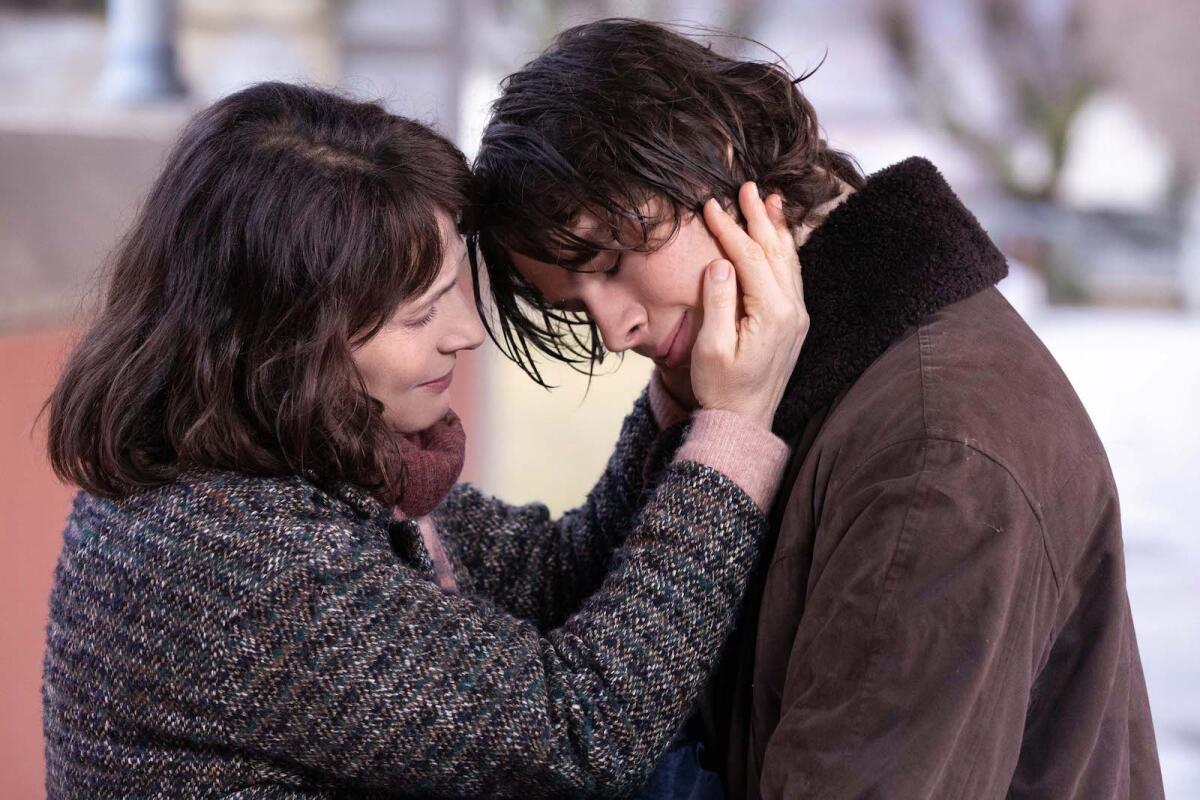The natural horror of the biological ‘Clock,’ and more movies to stream

- Share via
‘Clock’
Multiple horror movies have explored how far some people will go to conceive a child, but writer-director Alexis Jacknow’s “Clock” goes a step further, weighing the stress heaped on a women who just wishes she wanted kids at all. Dianna Agron plays Ella, an interior designer tired of disappointing her father (Saul Rubinek), her husband (Jay Ali) and her friends with her profound disinterest in procreation. She seeks help at an experimental clinic where Dr. Elizabeth Simmons (Melora Hardin) gives her an implant and subjects her to psychological treatments that make her baby-crazy — emphasis on the crazy.
Expanded from a short film, “Clock” doesn’t have quite enough story to fill out a feature. As the implant takes hold, Ella begins to experience hallucinations and violent mood swings; and Jacknow spends much of the movie riffing on that, going deep into Ella’s head as she sees ghosts of long-dead relatives and develops an obsessive craving for eggs. While the movie becomes a little repetitious in the middle, it ends strongly with a succession of unforgettable scenes of gruesome body horror. “Clock” leans too heavily on too-obvious visual metaphors, but it’s still a vivid and visceral explication of one woman’s fears. As she contemplates childbirth and motherhood — picturing a future of physical distress and unending filth — Ella’s terror can in no way be called “supernatural.” It’s the most natural feeling imaginable.
‘Clock.’ Not rated. 1 hour, 31 minutes. Available on Hulu

‘Freaks vs. the Reich’
There are strong Guillermo del Toro vibes in writer-director Gabriele Mainetti’s “Freaks vs. the Reich,” a fantasy film about super-powered circus performers in Nazi-occupied Italy. The primary villain is Franz (Franz Rogowski), a German officer who can see into the future and knows what will become of Hitler and his empire. (The future also teaches this creep how to play Radiohead songs on the piano.) So Franz tries to reverse Germany’s fate by exploiting four sideshow stars: Cencio (Pietro Castellitto), a pale young man who can summon insects; Mario (Giancarlo Martini), a clown with magnetic skin; Fulvio (Claudio Santamaria), a super-strong wolf-man; and Matilde (Aurora Giovinazzo), a girl charged with electricity.
The more fanciful qualities of “Freaks vs. the Reich” work fairly well. Mainetti has a gifted cast and a talented special effects department, so the scenes of these X-Men-like outcasts fighting fascism do look fantastic. But the film’s exhausting length is a challenge, as is Mainetti’s failure to use his historical setting meaningfully. His Nazis are evil enough, and the movie does acknowledge the existential threat of the Holocaust. But the story still seems unserious about World War II’s horrors. Action-adventure fans who can overlook all that may appreciate what is essentially an offbeat superhero picture. Others should wait for a sequel where the Freaks fight aliens or monsters or something.
‘Freaks vs. the Reich.’ In Italian with subtitles. Not rated. 2 hours, 21 minutes. Available on VOD; also playing theatrically, Laemmle Glendale

‘Winter Boy’
French filmmaker Christophe Honoré draws on memories of his father’s death for “Winter Boy,” a contemporary drama that filters the writer-director’s personal experiences through the perspective of a 21st century 17-year-old, Lucas Ronis (Paul Kircher). When his father (played by Honoré) is killed in a car accident, Lucas leaves his boarding school and finds himself surrounded by relatives and family friends who veer between expressing sympathy and arguing about politics. Between comforting his mother (Juliette Binoche) and receiving sage advice from his older brother (Vincent Lacoste), Lucas seeks solace in the arms of his boyfriend, Oscar (Adrien Casse), while nurturing a crush on his brother’s roommate, Lilio (Erwan Kepoa Falé).
“Winter Boy” is enlivened by Honoré’s observations about the aftermath of a personal tragedy. For some, life goes on. For others, like Lucas, a death in the family offers a chance to try new things without fear of judgment. Ultimately, this film celebrates living — including the part that includes taking big swings and making terrible mistakes.
‘Winter Boy.’ In French with subtitles. Not rated. 2 hours, 2 minutes. Available on Mubi
Also on VOD
“Grand Knighthawk: Infiltrating the KKK” is a collaboration between ABC News and the Associated Press, covering the FBI’s efforts to expose the modern proliferation of white supremacist organizations and their secret connections to local law enforcement. With the help of interviews and undercover recordings, the documentary tracks a five-year investigation into groups who both work within the law and consider themselves outside of it. Available on Hulu
“From Black” stars Anna Camp as Cora, a broken woman wracked with grief since her son disappeared five years earlier, while she was in a drug-induced stupor. Writer-director Thomas Marchese and co-writer Jessub Flower introduce elements of supernatural horror as Cora works with an amateur spiritualist (John Ales) to receive visions of what happened to her child, though this muted and mournful movie is more about a mother reckoning with her own failures. Available on Shudder
More to Read
Only good movies
Get the Indie Focus newsletter, Mark Olsen's weekly guide to the world of cinema.
You may occasionally receive promotional content from the Los Angeles Times.










